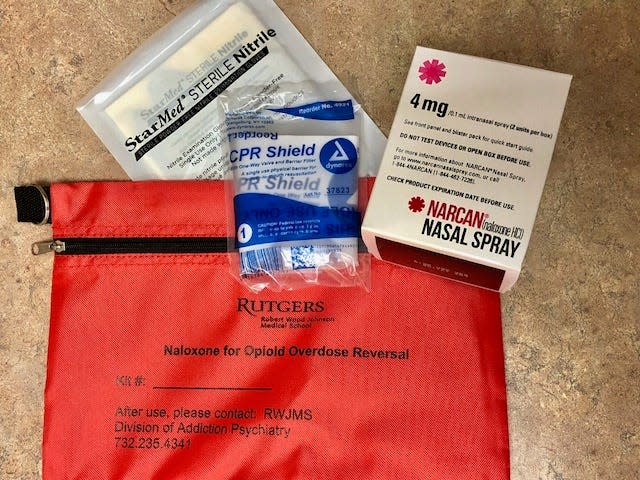We have to fix New Jersey's drug and alcohol addiction recovery system
The New Jersey State Commission of Investigation recently issued a report recommending the formation of a task force to strengthen addiction treatment regulations in the state to ensure the well-being of individuals seeking help for their struggles with substance abuse.
The report’s findings are timely and relevant given Gov. Phil Murphy’s efforts to combat the opioid epidemic. The state is set to receive more than $1 billion over the next 18 years as part of national legal settlements with pharmaceutical companies and consulting companies for their role in the opioid crisis. The funds are to be used only for initiatives to save lives, promote addiction prevention and harm reduction, increase access to treatment and recovery services, and otherwise mitigate the harms that the opioid crisis has visited upon our communities.
More than 9,800 New Jerseyans have died from a prescription opioid overdose over the last 10 years, according to the New Jersey Department of Health. Last year, more than 2,500 New Jersey residents died from suspected illicit drug use, according to the state Office of the Chief Medical Examiner.

In the ongoing battle against substance abuse and addiction, there is a pressing need for decisive action to ensure the integrity of addiction rehabilitation services, thereby protecting vulnerable individuals seeking treatment.
As the chief executive officers of two world-class neighborhood substance use disorder (SUD) treatment facilities, we feel compelled to confront the deeply troubling revelations of widespread abuses and unethical practices within the recovery industry.
The recent recommendation by the commission to establish a task force comprising diverse stakeholders to examine how to further strengthen industry regulations is not just a suggestion — it is a call to arms that demands a collective response. It is an effort to recognize the urgency of the situation and the need for comprehensive solutions.
The proposed task force, which would include industry professionals, government and health care representatives, patient advocates and other interested parties, reflects a holistic approach essential for navigating the complex landscape of addiction rehabilitation. By actively participating in this initiative, we are confident that we, along with others, can contribute meaningfully to the discussions on potential oversight structures and strategies for improving collaboration among existing agencies.
The treatment centers we lead stand out for their unwavering dedication to tailored care and demonstrable outcomes across each patient's path to recovery. We have embraced the core tenets outlined by the National Institute on Drug Abuse and the National Institute on Alcohol Abuse and Alcoholism, integrating evidence-backed principles into our treatment model. Our commitment ensures that patients receive the most current research, innovative approaches and a holistic methodology toward addressing addiction and sustained recovery.
We call on addiction industry leaders in our state to join this task force and advocate for robust measures that will not only address the current challenges facing the industry but also pave the way for a future where individuals seeking help can trust in the integrity of the rehabilitation process. Through collaboration and shared expertise, we can develop strategies that protect vulnerable individuals, hold the industry accountable and foster a culture of transparency and ethical practices.
There must be a mechanism put into place that allows every New Jersey resident, no matter their knowledge of addiction treatment, to feel confident that they or their family member is selecting a treatment facility that will offer proper, competent care.
We know change will take time. In advance of any new regulations enacted by a task force, how do you identify a reputable addiction treatment center? What should individuals who are suffering today look for to achieve lasting recovery? Here are some questions they should ask:
Does the treatment center under consideration use practices that are evidence-based?
Does it employ licensed and experienced professionals, including therapists, counselors and medical staff?
Does it treat first-time recovery patients differently from a returning or relapsed patient with different experiences and triggers?
Does it address patients with co-occurring disorders for SUD as well as mental health and other contributing factors?
Does it provide ongoing support and aftercare programs to help individuals transition back into their daily lives and maintain long-term sobriety?
Does it accept a wide range of health insurance carriers, to ensure accessibility and reduce cost barriers for patients?
Trustworthy treatment centers are transparent about their admission process, costs and available services. Be cautious of facilities that make unrealistic promises or lack clarity in their communication.
Each person's journey to recovery is unique, and a reputable treatment center recognizes this by creating individualized treatment plans tailored to the specific needs of each patient. Personalized care enhances the chances of successful recovery.
The time for change is now. We are ready to join commission Chairwoman Tiffany Williams Brewer at the forefront of this transformative movement.
Let us unite in our commitment to combating drug and alcohol substance abuse and addiction, ensuring that every individual on the path to lasting recovery receives the care they deserve. By rebuilding trust in the rehabilitation services that play a critical role, we can improve outcomes for all individuals affected by addiction.
LeoDante Ognibene is CEO of Recovery Centers of America at Raritan Bay in South Amboy and Bobby Bunyon is interim CEO of Recovery Centers of America at Lighthouse in Mays Landing. Recovery Centers of America is dedicated to helping patients achieve a life of recovery through evidence-based alcohol and drug addiction treatment. Call 1-844-5-RCA-NOW — 844-572-2669 — for help today.
This article originally appeared on NorthJersey.com: New Jersey's drug and alcohol addiction recovery system must be fixed
